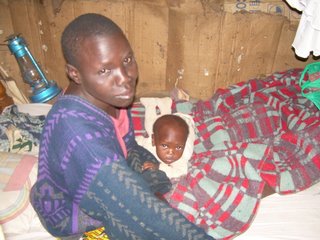21 August 2006
"KARIBU" - A PERSONAL REFLECTION
In the company of two young Kenyan guides I spent a total of six days walking the alleyways of Kibera and visiting people (mainly women) living with the HIV/AIDS infection.
Kibera is the largest urban slum in Nairobi. It is home to an estimated 750,000 –1,000,000 people crammed together in mud and wattle, tin roofed shanties. The alleyways are unpaved, steep and often running beside, or over, open sewers and drains. Few of the dwellings are owned by those living in them – rather they are rented. Rent for a very basic single room in Kibera is around 600 Shillings per month. One Australian Dollar is about 50 Kenyan Shillings (Ksh)
Most of the residents we met were too ill to work and hence were in arrears with their rent and facing eviction. Frequently a woman on her own was attempting to raise her children. Often she was also caring for the children of a sibling who had died – sometimes this meant up to ten children living with the woman in a one-roomed house. Providing food and an opportunity for education as well as paying the rent was a near impossible task. Some we met had not eaten for more than a day.
Prostitution is widespread, being the last resort of desperate women to place food on the table for their children. The common rate for servicing a 'client' is 20Ksh. By comparison the cost of 300ml of paraffin cooking oil is 10Ksh; a kilo of flour costs 35Ksh; 18 litres of water costs 3Ksh and the cost of a visit to a toilet is 2Ksh.
I experienced a range of reactions and emotions in Kibera. In turn I was overwhelmed by the affront to human dignity I witnessed, I felt consumed by guilt when I reflected on the extravagance of my own western lifestyle and I was inspired and uplifted by the faith, resilience and generosity of welcome I encountered everywhere I went.
How to respond? On each visit we brought gifts of food purchased from our own pockets. It helped some individuals for a day or two, but obviously it could not possibly begin to address the immensity of the need. There are many charities working in Kibera and other similar places, but more than charity is needed.
We could of course just decide it is all too hard, close our eyes, go home and try and ignore the issue.
Or we could continue to live with the challenge of trying to respond in some way whilst fully realizing that our response is always inadequate and full of contradictions.
This bulletin is founded on the conviction that if enough of us truly believe that a different world is possible and are prepared to work together for change then together we can make a real and lasting difference.


I am left with an overwhelming sense of powerlessness in the face of such poverty and degradation. Thank you for your participation in Karibu, for your reflection and photo and for the inherent challenge to live differently, to work for a more just world.
Thank you, too, for faithfully publishing the bulletin.
Fraternal regards,
Jim Donovan
